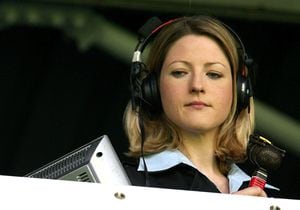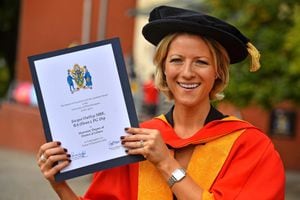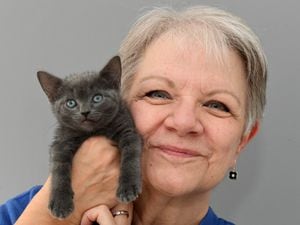Jacqui Oatley talks Women in Football and it's successful #WhatIf campaign
Jacqui Oatley is backing a campaign challenging discrimination in football and lobbying for change in the sport industry – #Whatif

We’re supporting and encouraging other women to believe they belong in the football industry.”
Since becoming Match of the Day’s first female commentator in 2007, Jacqui Oatley has helped pave the way for a new generation of female sports reporters, commentators and pundits.
But the Wolverhampton-born broadcaster says that while the industry has changed ‘a huge amount’ during that time there is still more work needed to make it an equal playing field.
And that’s where Women in Football (WiF) comes in. It’s a network of professional women working in and around the football industry supports and champions their peers.
“There are some innate prejudices and women can feel intimidated and not fulfil their potential as a result,” says Jacqui, one of the founder members of the campaign group working to tackle these issues.
Founded in 2007, it also aims to challenge discrimination and lobby for change in the sport industry and eliminate negative attitudes towards women working in football.
While members are they to support each other and share their professional advice in the hope of encouraging more females into the industry.
“It’s about proactively listening to the issues that people have and trying to resolve them for people.
“When I first started I didn’t know another female commentator I could call and say ‘what do i do?’
“Now there is a lot more women in football so you might find five or six women in a office but in some there may still only be one,” says the University of Leeds graduate who grew up in Codsall.
Launched in May, WiF’s #WhatIf campaign challenged organisations and individuals to pledge ways in which they could support women in football or improve the environment for women in football.
Pledges have ranged from Judy Murray delivering a coaching masterclass to Scottish female football coaches to organisations such as Uefa announcing that it would increase spending on women’s football by 50 per cent.
“It’s just been overwhelming. We’ve had something as small as a player saying they were going to take a group of women to their next game to Sky Sports pledging to include female talent as studio pundits on Gillette Soccer Specials.

“We had Barclays pledging to conduct a full scale research project to understand the position of women in the football industry. Twitter created an original emoji for Women in Football which is a brilliant thing to do. If you type #womeninfootball into Twitter it comes up,” former Wolverhampton Grammar School pupil Jacqui tells us.
She recorded a video for the #WhatIf campaign for Twitter in which she talked about having a responsibility to encourage other women.
“I think it’s really important we support each other. It’s been a case of making football more of an equal environment, because there are so many talented women out there.
“There is still a way to go, because we can’t change people’s perception overnight, but hopefully the number of viewers and listeners who feel it is completely normal for a female to report, commentate, present, is there.
“It is going to take a couple of generations to change but it is changing already,” says Jacqui in the video which sees her drinking out of a Wolves mug.
While there has been improvement, women still remain significantly under-represented in certain areas of the industry,’ the mother of two tells Weekend.

“There is more scope in print journalism and in football boardrooms – women are under-represented there. Also, sports and football physiotherapy. Some managers think it’s not a good idea to have a female physio. I would beg to differ. It can have a positive impact and a woman can help puncture that atmosphere a room full of testosterone can manifest,” says Jacqui.
She would like to see more female football writers employed by newspapers and paid tribute to well-respected journalist Vikki Orvice, who was a Women in Football founding board member.
Vicky blazed a trail for women in sport during a 24-year career in national newspapers, after becoming the first female staff football writer on a tabloid in 1995.
She died last month, aged 56, after being diagnosed with breast cancer in 2007.
Jacqui says despite the improvements in the industry since Vicky started out, more work still needed to be done to encourage women into sports journalism. “We’re not that much further forward all these years later,” she adds.
A keen footballer and fully qualified FA coach herself, Jacqui made the switch from intellectual property rights management to sports broadcasting after suffering a serious knee injury while playing for Chiswick Ladies FC in 2000.
Starting out on hospital radio in London, she took evening courses in print journalism and radio production before moving to Sheffield to study for a one-year postgraduate diploma in broadcasting.
As a non-league football reporter with Radio Leeds, she made her commentary debut for a match between Wakefield & Emley v Worksop Town in the Unibond League.

She joined BBC Radio 5 Live in 2003 and became the first woman to commentate on a football match on British network radio in 2005.
Two years later she made her Match of the Day debut and since then has become a familiar face on BBC shows including Final Score and The Football League Show as well as being a football anchor for ITV sport.
She was a co-presenter of Euro 2016, alongside Mark Pougatch, and could be found pitch side during the 2018 World Cup in Russia as part of the ITV team.
Jacqui, who received an MBE for services to broadcasting and diversity in sport in 2016, says she still has to pinch herself every time she reports and presents from a major tournament.
“The first World Cup I remember being absolutely gripped by was Italia 90. Never in a million years did I think I would be going to a World Cup let alone reporting pitch side at one in Russia,” she tells us.
The growing popularity and development of women’s football can only be positive and help attract more girls into the industry, believes Jacqui.
“It’s certainly improving and has come a long way. It was held back for 50 years because women were banned from playing in 1921.
“It’s interesting to think where it would be if it hadn’t been for the ban.
“It’s exciting to think where it could be in another 20 years,” says Jacqui, who was also the UK’s first female darts presenter.

When she’s not in the commentary box, Jacqui,a former season ticket holder at Molineux, is keeping a close eye on her beloved Wolves and their ascent to the top half of the Premier League.
“I still can’t believe we’re here at the start of March with Wolves seventh in the Premier League and in the last eight of the FA Cup – it’s completely nuts.
“There’s plans for a new stadium, there’s been huge investment and the quality of the football is superb. It’s structured off the field and it’s structured on the field, it’s a joy to watch.
“To go the 95th minute against Newcastle and almost expect an equaliser is very un-Wolves like. It’s very enjoyable and exciting to be part of,” says Jacqui, who was recognised in Wolverhampton’s 2017 Famous Sons and Daughters Awards.
Her advice for any girl or woman wanting to enter the football industry is to not let anything hold them back.
“Don’t sit at home and think you can’t do it, give it go. Be prepared to work very hard and work anti-social hours for very little pay at the start.
“Do something as soon as you can to get started, get work experience, write a blog, just get that foothold and then keep moving onto the next step.
"If you’ve got the passion and the drive, don’t take no for answer. Work hard and be nice – that’s my motto,” says Jacqui.





